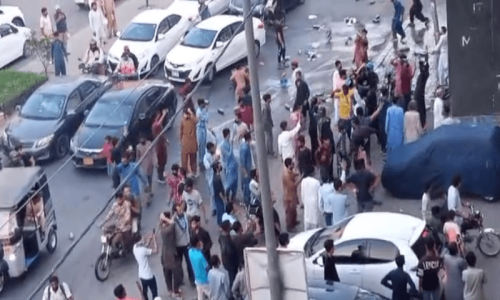HIFSA, Niazmanna, Ziafat, Subia and Murwah entered the foyer along with their ‘mother-mate’. “These are our daughters,” said Hasnain Raza, member of the Pakistan Sweet Homes. The girls from North Waziristan have been left orphaned during the Zarb-i-Azb operation.
Hifsa’s green eyes, Niazmanna’s mischievous grin, Murwah and Subia’s smiles and Ziafat’s golden-brown ringlets brought instant warmth to the room. Aged between five and eight, Hifsa and Subia are sisters, Murwah is their stepsister and Niazmanna and Ziafat they met here.
“Our district officers were given a task when the army operation began — to locate children in IDP camps who have lost their parents,” said Raza. In the last one and a half months, they have brought back 25 boys and five girls to Islamabad. The girls were all found in IDP camps in Bannu and were brought here as no guardians could be found to take responsibility for them.
With Pashto being a barrier between us, we communicated through smiles and tickles, erupting in giggles. One ‘mother’ here is responsible for 10 kids, their clothes, food, homework and health. With her face veiled in a blue chador, the ‘mother’ communicated my questions to the girls in Pashto but the girls were reluctant to respond.
The ‘mother’ said that when the girls first came, they would talk about their homes, the fighting and the noise. However, recollecting the traumatic experience or posing questions is discouraged.
With 30 centres in 28 cities, Sweet Homes is a hostel for boys at night, a school during the day for both boys and girls and is home to 3,400 kids across the country. The children here are from Dera Bugti, Kashmir, Bannu and various parts of North Waziristan.
Back at the main centre where the boys reside, I met Shahzaman from Razmak. This 10-year-old was found under the debris of the roof of his house, which had collapsed during the army operation. He was not able to get to a hospital for two days, as a result of which he lost his right leg. Sitting on his wheelchair, Shahzaman was responsive when questions were asked in Pashto.
He said he had three brothers and one sister who were still in Razmak. However, Raza pointed out that children from these areas live with their relatives and often refer to their cousins as siblings.
Raza said a proper background check is done before a child is brought here. “Our district officers verify that a child is an orphan and go to his house or the address given, to confirm,” he said. Those who have guardians, like Shahzaman, speak to them on Saturdays and Sundays over the phone. He added that the military often helps them bring the children to Islamabad and the army has also sent several children to the centre.
With Shahzaman and his friend in the room with us, Raza looked on with pride at the two and recalled the story of the first kid brought to Islamabad in 2009. “I was working in the IDP camp in Malakand,” he said. “A man came and left a baby in Zamarrud Khan’s arms. We were all left stunned and wondered where to take him.”
Khan, now chairperson of the Pakistan Bait-ul-Maal, brought the child to Islamabad and that was the beginning of this project.
“Seventy per cent of the children here are affected by militancy,” said Raza. “But when they come here, after two or three difficult days, we ensure they mingle with the rest of the children.”
“These children should not be treated separately,” said I.A. Rehman, director of the Human Rights Commission of Pakistan.
“Just because they have lost their parents does not mean they suffer from a disability.” He added that the question of orphaned children became acute in the aftermath of the 2005 earthquake in Azad Kashmir and during the Swat operation as well. “It is a specialised job and the treatment meted out to them is far from satisfactory.”
Rehman said that where health and education needs are the most important considerations, the issue of property is imperative as other people grab it once these children are brought here. “A consortium of departments should look after the property of these children when they are taken away,” he said.
“If these children weren’t brought here, they would perhaps be trained in seminaries and brainwashed and might eventually end up as extremists,” said Raza.
I glanced at Shahzaman and his friend, and thought of the five girls I had met earlier and about how their beautiful faces concealed heartbreaking stories. Their pretty dresses, henna-decorated hands and strewn-around textbooks were a relief as they showed signs of a regular life.
Seeing Raza and other members of the centre refer to these children only as “our sons” and “our daughters” was comforting. To think of the alternative made me shudder.
Published in Dawn, October 26th, 2014














































